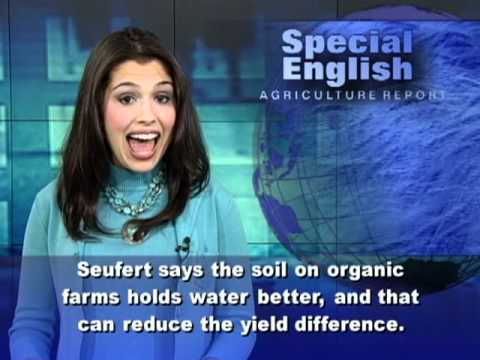The Limits to Organic Farming in Feeding the World
 |
This is the VOA Special English Agriculture Reportt, from voaspecialenglish.com | facebook.com/voalearningenglish
Organic farming avoids the use of chemical pesticides and manmade fertilizers. Supporters say organic farming is better for the environment than other methods. But studies have shown that organic farming often produces less food per hectare. That lower yield means feeding the world organically would require more land. But good farmland is limited. And scientists say deforestation from the clearing of land for agriculture is already a problem for climate change. In a new study, researchers wanted to measure the difference between conventional and organic yields. So they combined the results of sixty-six earlier studies. They found that some organic farms can yield almost as much as conventional farms. But most cannot. The findings were reported in the journal Nature. The study's lead author was Verena Seufert of McGill University in Canada. She says convention farms usually have higher yields than organic ones. But some activities, environmental conditions and even crops can narrow the differences. On average, organic farms produced twenty-five percent less compared to conventional farms. But yields of organic fruits and other perennial crops nearly equaled the yields from conventional ones. So did the yields of legumes such as soybeans. Legumes produce some of their own nitrogen fertilizer. However, organic vegetables and cereal crops had a lot lower yields compared to conventionally grown crops. Ms. Seufert says the soil on organic farms holds water better, and that can reduce the yield difference. Also, organic farmers can improve their yields by making sure crops get enough fertilizer. But increasing the nitrogen is harder to do organically, using just animal waste and crop rotations. Organic farmers rotate food crops with plants that fertilize the soil. But while these "cover," or fertilizer, crops are growing, food crops have to be grown on other land. And if farmers use manure, they have to feed the animals that produce it, and that requires grazing land or crop land. The United Nations says world demand for food will grow seventy percent by the middle of the century. John Reganold is a scientist at Washington State University. He says no one should dismiss organic agriculture as part of the solution. He says farming is increasingly a mix of organic and conventional methods. For VOA Special English, I'm Alex Villarreal.(Adapted from a radio program broadcast 01May2012)
|




